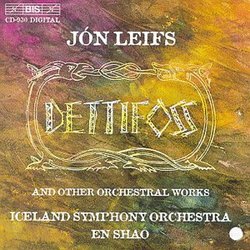The Saga World of Jon Leifs
Thomas F. Bertonneau | Oswego, NY United States | 11/01/2000
(4 out of 5 stars)
"Jón Leifs (1899-1968) more closely resembles Charles Ives than any other of Ives' fellow composers, the American ones included. An Icelander, Leifs studied in Germany but rejected Austro-German traditions in favor of cultivating the native forms of his Norse-speaking island-nation. What results sometimes little sounds like Western music, for gone are the ideas of development and fled are all the standard patterns; in their place stand the gawky, repeated rhythms of the rímur, the uncanny organum of tvísöngur, and the gigantic natural sounds of the Icelandic environment - the detonations of volcano and geyser, the rumble of cataracts, the crash of seawaves on the rocky shore. Like Ives, Leifs never thought twice about requiring enormous orchestras for his scores. The word "impractical" apparently did not exist in his lexicon. In the title-work of the present CD, "Dettifoss" (1964), Leifs calls on a large orchestra with a tremendous percussion section, plus a chorus, to recreate (that would be the accurate term) the experience of a visitor braving the elements to draw nigh Iceland's great waterfall, whereupon the subject dissolves in the crash and thunderation of it, and the voice of the waterfall itself speaks by means of the chorus. The "form" is drawing-nigh and then turning back again, but the colossal apparatus makes it quite impressive. Mind, there are no tunes, and the words sung by the vocal contingent are indiscernible in the circumambient roar, but the end justifies the means aesthetically speaking. The Organ Concerto, first heard in Nazi-dominated Wiesbaden in 1935, is equally unorthodox, despite conforming (well, more or less) to a passacaglia in its middle movement. The German audience hated it (it ain't exactly Handel), but anyone whose intellect was blissfully warped, in adolescence, by exposure to Ives will probably figure out how to come to terms with it. "Fine II" (there is naturally a "Fine I") is for string orchestra and vibraphone, and comes from late in Leif's career. He knew tragedy: First, while long-resident in Germany, he married a woman of Jewish extraction, and both his wife and their daughters lived under a death-threat in Berlin right through the end of the war. Later, one of the daughters drowned while swimming. "Fine II" is a low-key farewell to life; Leif was ill when he wrote it and must have sensed that his own death was near. The "Variations" don't measure up to the other works, but Leifs, like Ives, created unevenly. BIS also puts out Leifs' "Saga Symphony," and discs with his "Hekla" and "Geysir," companion pieces to "Dettifoss." My son, age five-and-a-half, really digs this music. "Play `Dettifoss' again, Dad." Let that tell you what it will."
Fabulous music in fabulous performances
G.D. | Norway | 06/13/2009
(5 out of 5 stars)
"Dettifoss belongs to the trio of work also comprising Geysir and Hekla - it is, thus, another one of those spectacular nature poems which combine glittering, magical musical material with visceral, primordial power, explosions and thunder. No, it isn't particularly strong on thematic material but then that was hardly the point; rather, the music sets itself up to conjure up the impersonal, inconsiderate, powerful, baleful and beautiful forces of nature, music of rocks and thunder and nature magic. The programme is a simple one; a depiction of the poet's approach towards the waterfall, observing it and then walking away. For the most time, the music sounds like living those forces of nature rather than merely observing them, and it doesn't really sound like music with any humans present. The answer is of course that the programme was tagged on merely to justify the crescendo, from the ominous rumbling in the distance, to the dizzying sheen and fortissimo power of the middle section. It's a wonderful work, perhaps not as immediately brutally overpowering as Hekla or Geysir, but the musical material is even stronger, and the work as a whole is even more magically atmospheric.
The Organ concerto is far less immediately appealing - it is, in fact one of Leifs's more difficult and forbidding works, darkly brooding and at times downright ugly with an enormous dynamic range. Often, it sounds like the combat between chaos and harmony, rumblings in the organ set against howls and creakings in the brass and woodwinds. There is also some formal ingenuity to the proceedings, but this is most of all a work of an almost wearisome, granitic and rumbling power and sense of ill-foreboding.
The contrast to the Beethoven variations could hardly be greater, even though the two works are written in the same year. They are at least at the outset gentle and pastoral, but sinewy and does at time suggest the same rugged primitivism as the other works here. But from the lyrical, mellow and beautifully romantic work it developes into something more jagged and primeval, almost as if the lyricism is pruned away to display the rugged, alien heart and skeleton of the music. Yes, it remains - somewhat - lyrical, but sounds, in the end, as an exploration of the dark underside of itself rather than anything pastoral.
Fine II is filled with slowly moving, subdued but smoldering power - like tectonic plates floating apart and together, but slowly and without chaos. It is, in the end, not the most memorable of Leifs's pieces, perhaps, but still reveals a highly original, masterly composer of unearthly beauty and very, very earthy, volcanic power. The performances are just superb, and the sound quality, though a little cavernous, vivid and with depth and perspective. Urgently recommended overall, really."


 Track Listings (16) - Disc #1
Track Listings (16) - Disc #1